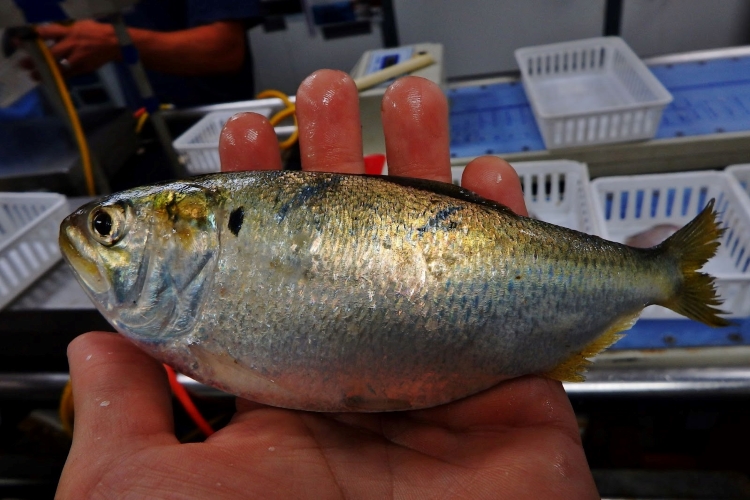ABBEVILLE, LA / ACCESS Newswire / November 5, 2025 / Last week, Backwoods University, a podcast series from the MeatEater network, explored the menhaden fishing industry, known locally as "pogie" fishing, along the Louisiana coast. At that time, host Lake Pickle was unable to reach a representative from the commercial sector. Since then, he connected with Ben Landry, Vice President of Public Affairs for Ocean Harvesters, who joined him for a bonus episode to provide the industry's perspective. "My job is not to tell anyone how to think," Pickle said. "My job is to try my best to present both sides and let people make up their own mind."
The conversation comes as the Louisiana Department of Wildlife and Fisheries prepares to vote on changes to buffer zone laws, which determine how close to shore menhaden boats may operate.
Listen to the full episode here
The episode provides an in-depth look at how the Gulf's commercial menhaden fleet views issues of sustainability, regulation, and coexistence with recreational fishing communities.

Gulf menhaden
The conversation begins by clarifying a common misconception about ownership. Both Ocean Harvesters and Westbank Fishing are American-owned and operated, using U.S.-flagged vessels. While processing companies such as Omega Protein and Daybrook Fisheries have foreign parent ownership, this structure does not affect or direct fishing operations or change the domestic nature of the fleets.
A major focus of the discussion is the ongoing debate over Louisiana's buffer zones, the designated distance commercial menhaden vessels must maintain from shore. The industry supports retaining the current half-mile buffer across most of the coast while allowing quarter-mile zones only in select, low-use areas without development, where recreational fishing is minimal. Larger, established buffer zones around Grand Isle and Holly Beach would remain intact. The goal, as outlined, is to balance access to nearshore menhaden schools, where the fish naturally congregate, while minimizing user conflicts on the water.
The episode also explores recent scientific work on bycatch, particularly a report indicating that about 85% of non-target fish survive when they remain in the net during pumping. However, survival drops sharply if fish enter the pump. To address this, menhaden fleets are working to redesign and standardized hose-cage systems to prevent large fish, such as red drum, from being pulled through the hose. The conversation describes how different configurations were tested across vessels this season to further improve survival rates. It is believed that this effort could dramatically reduce the bycatch mortality of the fishery.
Beyond bycatch mitigation, the industry has invested more than $3 million combined in stronger, more durable nets, significantly reducing accidental spills and tears, from about 15-20 per year just a few years ago to two this past season. These measures form part of a broader effort to demonstrate that the fishery can operate responsibly while maintaining jobs for Gulf Coast crews.
Pickle and Landry also discuss a recent incident involving menhaden boats and tarpon anglers. Tracking data showed vessels operating roughly three-quarters of a mile away from recreational boats during a legal set. The crews reported that any tarpon or sharks caught were released alive. The conversation emphasizes the importance of lowering tensions, maintaining open communication, and avoiding situations that could escalate conflict on the water.
Throughout the interview, Landry reflects on the long history of the menhaden fishery, which has operated for over 80 years in the Gulf and more than 145 years on the Atlantic coast, and on its continued role as a working-waterfront industry that supports local jobs. Both Pickle and Landry agree that improving understanding and dialogue between sectors is essential to maintaining sustainable fisheries and safe operations.
The episode closes with an invitation to Backwoods University from Ocean Harvesters to tour its facilities in Moss Point, Mississippi, and Abbeville, Louisiana, to see firsthand how the fishery operates.
The menhaden, or "pogie," fishery has supplied fertilizer, animal feed, bait, and omega-3-rich oils for over a century. Menhaden are small, oily fish that play a vital role in coastal ecosystems while supporting significant local employment. The industry operates under state and regional management and is subject to ongoing scientific monitoring to ensure sustainable harvest practices.
Backwoods University is a bi-weekly podcast series from the MeatEater network examining the intersection of outdoor life, conservation, and culture. Hosted by Lake Pickle, a lifelong hunter, conservationist, and Mississippian, the show highlights diverse perspectives on environmental and policy issues affecting the modern outdoors.
About the Menhaden Fisheries Coalition
The Menhaden Fisheries Coalition (MFC) is a collective of menhaden fishermen, related businesses, and supporting industries. Comprised of businesses along the Atlantic and Gulf coasts, the Menhaden Fisheries Coalition conducts media and public outreach on behalf of the menhaden industry to ensure that members of the public, media, and government are informed of important issues, events, and facts about the fishery.
Press Contact
Menhaden Fisheries Coalition
(202) 595-1212
www.menhaden.org
SOURCE: Menhaden Fisheries Coalition
View the original press release on ACCESS Newswire:
https://www.accessnewswire.com/newsroom/en/food-and-beverage-products/gulf-menhaden-industry-replies-backwoods-university-hosts-ben-landry-of-1097487
